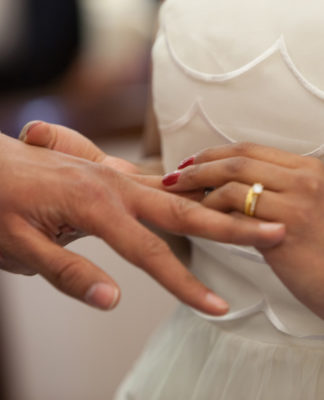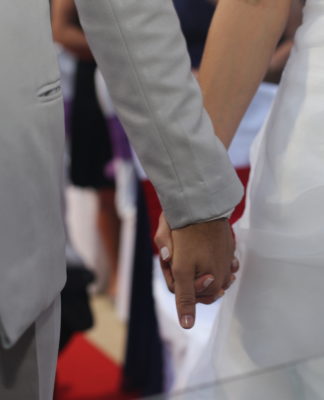You’ve heard the song and the lyrics.
“You always hurt the one you love, the one you should not hurt at all;
You always take the sweetest rose, and crush it till the petals fall;
You always break the kindest heart, with a hasty word you can’t recall;
So, if I broke your heart last night, it’s because I love you most of all.” The Mills Brothers (Written by Allan Roberts and Doris Fisher).
It is easy to understand how someone might break another person’s heart by not loving them back—when we do not love those who love us, we are likely to hurt them. However, the above moving song refers to hurting the one we do love. How can one both love and hurt the same person?
Hurting without intending to do so
“When you are in love and you get hurt, it’s like a cut, it will heal, but there will always be a scar.” Anonymous
Lovers can easily hurt the beloved without intending to do so. Because the lovers are so significant to each other, any innocent remark or action can be interpreted mistakenly as hurtful. For instance, someone might devote a lot of time to his or her work, thereby neglecting, and inadvertently hurting, his or her partner. The more time two people spend together, the greater the likelihood of this occurring. Our beloveds hold great significance for us and this makes them a source of great happiness and deep sadness alike.
In situations where we have nothing of value to lose, we seldom experience disappointment. In love, which involves our happiness and many of our most precious experiences, we might lose a great deal. Hence, disappointment, frustration, and hurt, are common. It has been said that completely blissful love does not exist. Indeed, in a survey of over 500 lovers, almost all of them assumed that passionate love is a bittersweet experience. Similarly, it has been found that people who exhibit less defensiveness have more experiences of love than do highly defensive people. This link suggests that to love is to make oneself vulnerable in ways that enhance the possibility of pain (Dion & Dion, 1975; Neu, 1996; Tennov, 1979).
There are many cases in which we unintentionally hurt our beloved as a result of external circumstances that are beyond our control. Take the case of two lovers who are married to other people, but profoundly in love with each other. One lover, who is able and prepared to get divorced, might be hurt by the other’s inability or unwillingness to leave their partner, believing that it indicates that their love for them is less deep. However, much as lovers really want to make their partner the happiest person in the world, external circumstances are beyond their control and make them behave in a way that hurts the partner.
Hurting while intending to do so
“I wanted to punch him and understand him at the same time.” Shannon A. Thompson, Take Me Tomorrow
The above and other considerations indicate how easily you can hurt the one you love without intending to do so. However, the explanation for deliberately hurting the person you love is far more complex. A few major factors in hurting the beloved deliberately are the issues of mutual dependency, caring, and behaving freely.
The issue of mutual dependency
“Loving someone who doesn’t love you back is like hugging a cactus. The tighter you hold on, the more it hurts.” Anonymous
Mutual dependency may exist in inappropriate proportions: lovers can consider their dependency on the partner to be too great or too little. Hurting the beloved may be one resort, usually the last one, which the lover takes to bring this dependency to its appropriate proportion. Mutual dependency has many advantages, stemming from the fact that two people are joined together in a relationship, attempting to increase each other’s happiness. However, a sense of autonomy is also important for self-esteem. Indeed, in a study of anger, the most common motive for its generation was the assertion authority or independence, or improving one’s self-image. Anger is perceived as a useful means for strengthening or readjusting a relationship (Averill, 1982).
This type of behavior is frequent in the child-parent relationship: children often hurt parents in order to express their independence. This behavior is also part of romantic love in which mutual dependence may threaten each partner’s independence. Sometimes lovers hurt their beloved in order to show their autonomy. Other times, however, hurting the beloved expresses an opposite wish: the lover’s wish for more dependency and attention. Indeed, a common complaint of married women, far more than of married men, is that their partners do not spend enough time with them.
By hurting the beloved, the lover wishes to signal that their mutual relationship, and especially their mutual dependency, should be modified. Hurting the beloved may be the last alarm bell that warns of the lover’s difficulties; it is an extreme measure signaling urgency. If the relationship is strong enough, as the lover wishes it to be, it should sustain this measure. A less extreme and more common measure is moodiness. Moodiness, which imposes a smaller cost on the relationship, may function as both an alarm bell and as an assessment device to test the strength of the bond. Love involves a dynamic process of mutual adaptation, but not all adaptive processes are smooth and enjoyable; hurting the beloved is an example in kind.
The issue of caring
“The easiest way to not get hurt is to not care but that’s the hardest thing to do.” Anonymous
A lover might also sometimes hurt the beloved for reason that have to do with the presence of sensitivity in romantic love. Since the lover cares greatly for the beloved and their mutual relationship, the lover cannot be completely indifferent toward the beloved. This lack of complete indifference toward the beloved may lead the lover to take measures that hurt the other when viewed from a partial perspective, but can be seen as beneficial from a global perspective. This is the painful side of care: a close connection exists between people who help and hurt as well. In the same way that improving the quality and happiness of our lives may demand some meaningful suffering, improving the quality and happiness of our beloved’s life may require such suffering.
As for people who love us, but whom we do not love, we can be indifferent, or might not harbor such a deep overall concern. Accordingly, we may not bother to help them by hurting them. Hence, people in love prefer to be hurt by the beloved rather than be treated with complete indifference. Jose Ortega y Gasset (1941) says, the person in love prefers the anguish that the beloved causes to painless indifference. Similarly, the saying goes that it is better to break someone’s heart than to do nothing with it. Concerning those who are near and dear, we prefer anger to complete indifference.
Behaving freely
The phenomenon of hurting with no intention can also be explained by referring to the trust and sincerity that are essential in love. Accordingly, the role of politeness or good manners, which can prevent some kinds of insult, is of less importance in such a relationship, and lovers are less careful in what they say and do. This opens the way for a lover to easily get hurt. The price of being able to behave freely, without social masks and without having to consider every consequence of your deeds, might be saying and doing hasty things that may hurt your lover.
Concluding remarks
“Each man kills the thing he loves.” Oscar Wilde
Hurting one’s beloved is frequent. Since the beloved is a major source of happiness, this person is also a major threat to our happiness: more than anyone else, the beloved can ruin our happiness. Similarly, the security involved in love goes hand in hand with the fear of losing that same security. Feeling happy is often bound up with the fear of losing that happiness. Caring for the beloved sometimes goes together with hurting the beloved. Love is closely connected with vulnerability: the ability to hurt and to be hurt. Although some kinds of hurt in love are intentional, most of them are not. Someone who deliberately and constantly hurts the other cannot simultaneously claim to love this person.
References
Averill, J. R. (1982). Anger and aggression: An essay on emotion. New York: Springer.
Ben-Ze’ev, A. (2000). The subtlety of emotions. Cambridge, Ma.: MIT Press.
Dion, K. K. & Dion, K. L. (1975). Self-esteem and romantic love. Journal of Personality, 43, 39-57.
Neu, J. (1996). Odi et Amo: On hating the ones we love. In J. O’Neill (Ed.), Freud and the passions. The Pennsylvania State University Press.
Ortega y Gasset, J. (1941). On love … Aspects of a single theme. London: Jonathan Cape, 1967.
Tennov, D. (1979). Love and limerence. New York: Stein & Day.
Updated from Ben-Ze’ev, The subtlety of emotions, and from an article in Psychology Today.


 Aaron Ben-Zeév, Ph.D., is Professor of Philosophy at the University of Haifa and former President of the University (2004 - 2012).
His research focuses on theoretical issues concerning the emotions, as well as the study of particular emotions. His major books are The Subtlety of Emotions (MIT, 2000), Love Online: Emotions on the Internet (Cambridge UP, 2004), In The Name of Love: Romantic ideology and its victims (With R. Goussinsky, Oxford UP, 2008); The Perceptual System (Peter Lang, 1993); and Die Logik der Gefühle: Kritik der emotionalen Intelligenz (Suhrkamp, 2009)
He received his B.A. in Philosophy and Economics (1975) and his M.A. in Philosophy (1977) from the University of Haifa, and received his Ph.D. from the University of Chicago (1981).
At the University of Haifa, Professor Ben-Ze'ev held several positions in academic administration prior to his election as President, including Rector, Dean of Research, Chairperson of the Philosophy Department, Head of the University of Haifa Press and Head of the Academic Channel.
Professor Ben-Ze'ev is considered one of the world's leading experts in the study of emotions, and he set up the Interdisciplinary Center for the Study of Emotions at the University. His research focuses on the philosophy of psychology, and especially the study of emotions. Most recently, his research has centered on love and romantic compromises.
AUTHOR OF
In the Name of Love
Aaron Ben-Zeév, Ph.D., is Professor of Philosophy at the University of Haifa and former President of the University (2004 - 2012).
His research focuses on theoretical issues concerning the emotions, as well as the study of particular emotions. His major books are The Subtlety of Emotions (MIT, 2000), Love Online: Emotions on the Internet (Cambridge UP, 2004), In The Name of Love: Romantic ideology and its victims (With R. Goussinsky, Oxford UP, 2008); The Perceptual System (Peter Lang, 1993); and Die Logik der Gefühle: Kritik der emotionalen Intelligenz (Suhrkamp, 2009)
He received his B.A. in Philosophy and Economics (1975) and his M.A. in Philosophy (1977) from the University of Haifa, and received his Ph.D. from the University of Chicago (1981).
At the University of Haifa, Professor Ben-Ze'ev held several positions in academic administration prior to his election as President, including Rector, Dean of Research, Chairperson of the Philosophy Department, Head of the University of Haifa Press and Head of the Academic Channel.
Professor Ben-Ze'ev is considered one of the world's leading experts in the study of emotions, and he set up the Interdisciplinary Center for the Study of Emotions at the University. His research focuses on the philosophy of psychology, and especially the study of emotions. Most recently, his research has centered on love and romantic compromises.
AUTHOR OF
In the Name of Love


















